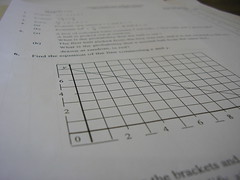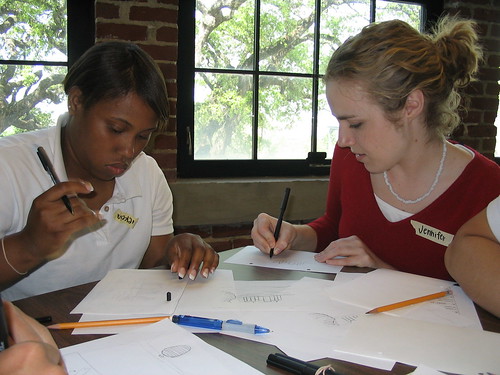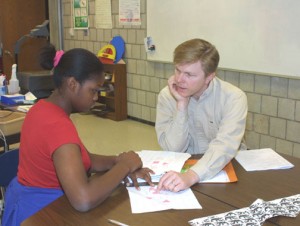 As you might’ve read in a previous post (https://njcashman.edublogs.org/?p=72), I attended the ECET2 conference in Seattle, Washington (Elevating and Celebrating Effective Teachers and Teaching) in the middle of July. While there, I attended a session entitled “Creating Reflective Scholars”, presented by Amanda Yoshida, which was all about encouraging and facilitating self-monitoring in students. Because I believe that students should take responsibility for their learning (see earlier post about grading), this appealed to me greatly. I took some notes and set them aside for awhile, just to let the ideas settle a bit, but with school starting in just a few weeks (gulp!) I needed to flesh this out a little.
As you might’ve read in a previous post (https://njcashman.edublogs.org/?p=72), I attended the ECET2 conference in Seattle, Washington (Elevating and Celebrating Effective Teachers and Teaching) in the middle of July. While there, I attended a session entitled “Creating Reflective Scholars”, presented by Amanda Yoshida, which was all about encouraging and facilitating self-monitoring in students. Because I believe that students should take responsibility for their learning (see earlier post about grading), this appealed to me greatly. I took some notes and set them aside for awhile, just to let the ideas settle a bit, but with school starting in just a few weeks (gulp!) I needed to flesh this out a little.
What are reflective scholars? A quick search brings no solid answers, unfortunately. Currently, my students spend a lot of time attempting tasks I give them to do (the idea that they should originate these tasks is perhaps the subject of a future post?). They dutifully work the problems, do the project, etc. and then rely on me to tell me how they did. Once I do, they move on to the next task. This reminds me like what I read on a shampoo bottle (you read them, right?) wash, rinse, repeat! In this way, I am not encouraging my students to be reflective scholars. They are not thinking about how they are progressing as they work, they’re just trying to get things done. Ms. Yoshida defined them this way: “Reflective Scholars assume responsibility of their learning through reflection; they reflect on their progress toward the learning objective academically, and scholars are able to identify appropriate next steps in their learning.”
Considering my own thoughts and the ideas raised in this session, I considered how my students already kept track of their progress, but that progress was summative. The open gradebooks in Schoology (see www.schoology.com), our learning management system, (LMS) allows students to monitor grades. I know I can immediately improve this practice if what the students receive centers more on formative feedback, but that is still me reflecting to the students, not the students reflecting on their own learning. Here are some things I have used, and intend to use this year. Some I gleaned from this session, some I have used before.
Reflective responses after summative assessments
As a mathematics teacher, I give summative assessments. After each one, I ask students to respond to these questions:
1: List the questions you did correctly, and the accompanying standards or concepts. What did this test demonstrate about mastery in these areas, and what evidence is shown?
2: Toward which standards or concepts did the work on this test show progression, and how did the work show this?
3: What strategies did you use to be successful with the standards mastered? What preparation or test strategies did not work?
4: What is your plan of action (being specific here) that you will use to fully master the standards that are in progress?
While this practice seems to both fit the definition of developing reflective scholars and be effective for some of my students in helping them shape learning strategies, other students derived little benefit because they were not accustomed to thinking this way. To help, I’ve employed other strategies such as using polling through my LMS (in this case, Schoology)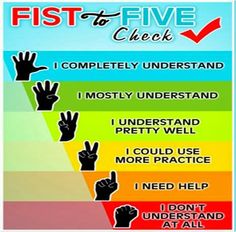 asking students to simply rate their confidence with the topic at the end of class; using Socrative (see www.socrative.com) to ask a couple of key exit questions (can also use googleforms for this); and using journaling or discussion questions on the LMS to find out what students are thinking about their learning. There are simpler versions of this, of course, including ‘fist to five’ rating system of comfort or self-assessment of progress (see, for example, http://tinyurl.com/pslbn23).
asking students to simply rate their confidence with the topic at the end of class; using Socrative (see www.socrative.com) to ask a couple of key exit questions (can also use googleforms for this); and using journaling or discussion questions on the LMS to find out what students are thinking about their learning. There are simpler versions of this, of course, including ‘fist to five’ rating system of comfort or self-assessment of progress (see, for example, http://tinyurl.com/pslbn23).
This school year, I intend to try some ideas I learned from the session (or the thinking it inspired).
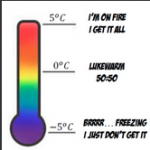 Put a ‘learning thermometer’ in the classroom and ask students to put sticker or post-it note on it at the beginning and again at the end of class; (see missbresources.com for this thermometer)
Put a ‘learning thermometer’ in the classroom and ask students to put sticker or post-it note on it at the beginning and again at the end of class; (see missbresources.com for this thermometer)
Have students share their biggest or favorite ‘fail’ of the day and what they learned from it (remembering that fail is an acronym for ‘first attempt in learning’)
Use something like futureme.org, or some other email scheduler, to have students create goals for the next class, next assessment or next term;
Incorporating a technique like ‘My Favorite No” as seen in this Teaching Channel Video (https://www.teachingchannel.org/videos/class-warm-up-routine) to have students reflect on what they learn from their errors.

Francisco Osorio via Compfight
Possible pitfalls If students do not see me reflecting on my progress and acknowledging my challenges they will not either. I have to walk, not just talk. Second, until students get comfortable ‘going public’ with their reflections, I need to give them opportunities to be publicly anonymous (e.g. post-it notes without names first) but privately transparent (journaling, reflective paragraphs, voxer messages, etc.) Additionally, incorporating growth mindset language in my own reflections and asking for it from students should help reinforce that success in learning mathematics requires work, perseverance, frustration and challenge. How great, though, would it be for a student to look back over their reflections to see their own journey of growth? That would be awesome!
I’d love to hear your plans for helping develop reflective scholars in your classroom, especially from other high school teachers. What has worked? What didn’t? Better yet, I’d love to connect on twitter or voxer to share those thoughts!
Shout out to Amanda Yoshida for leading this session and for widely sharing her ideas and resources! Follow her on twitter @ayoshida22.

